
Centre of Jaina Studies Newsletter: SOAS - University of London
Jainism lays great emphasis on the code of conduct of ascetic life. Having achieved victory over the senses and the mind, a Jaina ascetic is completely detached from mundane affairs, including severance from all connections to family and acquaintances. In addition, he should not have any attachment to material objects. However, he is permitted to possess without attachment three religious articles that have been associated with Jaina monks since ancient times. These are: a book (jñānopādhi), a pot for water used for ablutions (śaucopādhi or kamaṇḍalu), and a peacock-feather broom (mayūra-picchī, or saṃyamopādhi).
The mayūra-picchī is made from the feathers dropped by peacocks during the rainy season. The ancient Prakrit texts Mūlācāra and Mūlārādhanā describe the five qualities of the mayūra-picchī. It is clean not soiled either with dust or with sweat , soft, non-injurious, tender and light.[1]
All contemporary Digambara Jaina monks and nuns, and some renouncers, use a mayūra-picchī as an essential article for their religious activities.[2] It serves the purpose of avoiding violence by gently sweeping from harm any living organism, no matter how small. In accordance with the obligatory practice of paḍilehaṇā, a monk inspects every religious place he uses, and gently removes every living creature with the mayūra-picchī. All this must be done with utmost care, without causing injury to any living being. There are many references to the mayūra-picchī in earlier Jaina literature. In these texts, it is also called paḍilehaṇī in reference to the practice of paḍilehaṇā.[3]
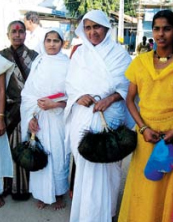
Āryikās and laywomen in Śravaṇabeḷagoḷa.
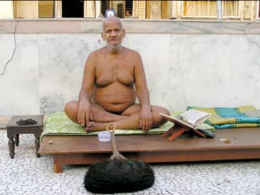
Muni Prabhāvasāgara in Mumbai, 2003
Every Jaina monk performs religious activities in accordance with five great vows, five samitis and three guptis etc. Samiti denotes five kinds of careful behaviour required of Jaina monks. The ādāna-nikṣepaṇa-samiti is the monastic rule of vigilance and taking great care in lifting up and putting down articles necessary for religious life. It requires using a mayūra-picchī for wiping the article and the place where it is to be put, after having inspected both with the eyes before touching them. This procedure is aimed at the avoidance of violence in every action of a monk.
There are clear references to this samiti in Kundakunda's Niyamasāra, Vaṭṭakera's Mūlācāra and in the Uttarādhyayanasūtra of the Jaina Āgamas. The pratiṣṭhāpaṇa-samiti is also to be observed by Jaina monks. It prescribes that the mendicant should dispose of bodily wastes in a place which is free of living beings and unfrequented by man. The mayūra-picchī is used to ensure that these areas are clear of living organisms, and facilitates the avoidance of violence towards living beings in these activities of Jaina monk.
In his recent book Picchi-Kamaṇḍalu, the Digambara Jaina monk Ācārya Vidyānanda explains that in accordance with the śramaṇa tradition, Digambara Jaina monks always possess one mayūra-picchī and one kamaṇḍalu for religious use and for meeting their daily requirements with strict non-violence.[4] The author likens these two objects to two hands, as they enable the monk to be independent in performing his great vows and maintaining other qualities of a Jaina saint.
A mayūra-picchī is also a means for identifying true Digambara Jaina monks. When householders see a Digambara Jaina monk with a peacock-feather broom, they know that he is a real, non-attached, non-violent Digambara monk, and not an artificial monk. It is also said in Śivārya's ancient Prakrit text, Bhagavatī Ārādhanā, that the mayūra-picchī (paḍilehaṇī) of the naked monk creates trust regarding his vairāgya (renunciation) and true monkhood in the people. The mayūra-picchī with the naked monk also represents the earliest tradition of the saṃyamī (self-restrained) Jaina monks.[5]
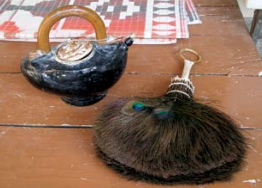
A pot for water used for ablutions (śaucopādhi or kamaṇḍalu), and a peacock-feather broom (mayūra-picchī, or saṃyamopādhi).
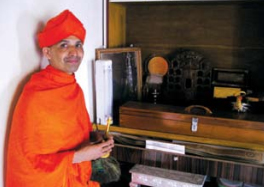
Bhaṭṭāraka Cārukīrti of the Mūḍabiḍrī Maṭha holding a ceremonial mayūra-picchī with a golden handle, 2005.
There are several references to the mayūra-picchī in early Jaina literature, and there is archaeological evidence as well. The mayūra-picchī appears in 10th-century stone reliefs on screens in the Candragupta basti at Candragiri hill in Śravaṇabeḷagoḷa, Karṇāṭaka. The stone carvings depict Śrutakevalī Śrī Govardhana Ācārya and other Digambara Jaina monks of his order walking with mayūra-picchīs in their hands. (Figure 1) In one of these the monks are accompanied by a child named Bhadrabāhu, son of Somaśarmā of Kotakapur village. (Figure 2) Thus it is evident that Digambara Jaina monks of the Śramaṇa tradition have carried the mayūra-picchī since ancient times.
Ācārya Kundakunda prescribed in the Bhāvapāhuḍa that the naked monk (jinaliṅga) is without sin and pure. The commentator of this text has explained that the peacock-feather broom and water pot facilitate this purity.[6] Jaina writers of later periods also described the mayūra-picchī as an article of utmost need for Jaina monks. In this connection it is said in the BhadrabāhuKriyāsāra text that without using the mayūra-picchī for paḍilehaṇā, Jaina monks commit violence toward small living beings when sitting, standing, moving or performing other activities. As such the monk does not attain liberation from the bondage of karma.[7] Therefore, there is no possibility of liberation without using a mayūra-picchī.
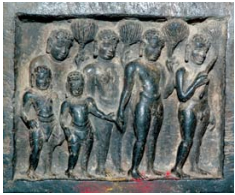
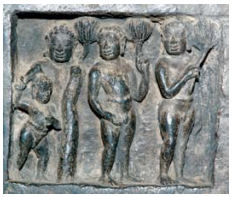
Figures 1 and 2. Digambara monks holding mayūra-picchīs can be seen in stone reliefs on screens in the Candragupta Basti at Candragiri hill in Śravaṇabeḷagoḷa, Karṇāṭaka. Dated to ca. 973 CE, the panels depict the story of Govardhana Ācārya, dated to ca. 4th century BCE. Figure 2, on the right, shows Digambara monks with Bhadrabāhu, son of Somaśarmā of Kotakapur. An additional panel is shown on page 21 of the present volume. Photos: Prem Suman Jain, 2012.
Prem Suman Jain is retired Dean and Head, Department of Jainology and Prakrit, M. L. Sukhadiya University, Udaipur. Dr Jain has also served as Director of the National Institute of Prakrit Studies and Research, Shravanabelagola, and is the founding Editor of Prakrit-Vidyā and Prakrit-Tīrtha, research journals of Jainology.
rayaseyāṇamagahaṇaṃ maddava sukumāladā laghuttaṃ ca | jatthede paṃca guṇā taṃ paḍilihaṇaṃ pasaṃsaṃti || (Bhagavatī Ārādhanā, Gāthā 97).
The following Digambara Jaina renouncers are permitted to use the mayūra-picchī: monks (muni), nuns (āryikā), male renouncers dressed with one piece of cloth (elaka), male and female renouncers dressed with two pieces of cloth (kṣullaka; f. kṣullikā), and male celibate heads (bhaṭṭāraka) of monasteries (maṭha) and regional communities. Jaina Śvetāmbara monks and nuns also carry a broom, but it is made of woollen threads and is called rajoharaṇa or oghā. See: Ācārāṅgasūtra, S.B.E. 22, pp. 23, 55.
The following words are used for the peacock-feather broom in the Jaina texts: Skt. picchikā, picchī; Pkt. piṃchī, piṃcchi; Hindi: picchi.
 Prof. Dr. Prem Suman Jain
Prof. Dr. Prem Suman Jain